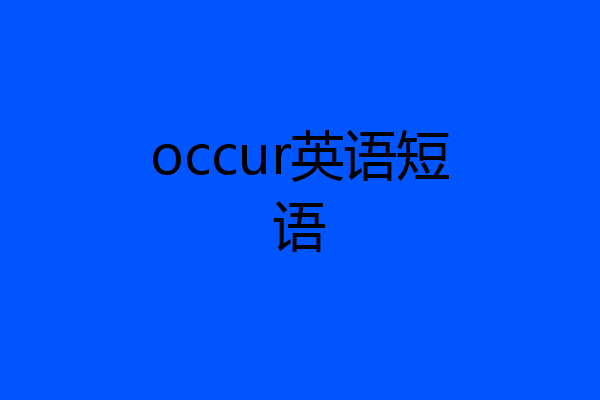
zhangyekiki
过去式:occurred。过去分词:occurred。occur,英语单词,主要用作不及物动词,意为“发生;出现;存在”。
v.发生; 出现; 存在于; 出现在;
[例句]We need to know the exact time the incident occurred.
我们需要了解事情发生的确切时间。
第三人称单数:occurs
现在分词:occurring
过去式:occurred
过去分词:occurred
It can occur on one or both sides.
它可以发生在一个或双方。
Why do they occur?
它们为什么会出现?
In this example, you want the three to occur one after the other.
在这个示例中,您想让这三个操作一个接一个地发生。


你瞅谁啊
表示发生的英语短语:
1、take place
2、come up
3、come to
4、come about
5、turn up
区别:
1、take place 表示“发生、举行、举办”,一般指非偶然性事件的“发生”,即这种事件的发生一定有某种原因或事先的安排,或者表示“举行某种活动”。
例句:Some of my most peaceful moments take place in my garden.
我的一些最和平的时刻发生在我的花园里。
2、come up(表示被提出)它的主语是事,或物
例句: If something comes up in a conversation or meeting, it is mentioned or discussed.
如果在这个交流或者会议中提到一些东西。
3、come to表示谈到, 涉及到。而且表示合计,总共,同 amount to。也表示开始被认识,猛地想起(无被动式)。还表示发生(在人身上), 降临于(某人),恢复知觉, 苏醒过来。
例句:When he came to and raised his head, he saw Barney.
当他苏醒过来抬起头时看见了巴尼。
4、come about表示“发生、产生”,指某些事产生了,但还未知原因,所以经常用于疑问和否定句。
例句:The peace agreement came about through intense pressure by the international community.
该和平协议是在国际社会的强大压力下产生的。
5、turn up(常指出其不意地或经长久等待后) 出现,到来,露面; 找出; 发现; 注意到; 出现; 开大,调高(收音机、暖气等);
例句:Richard had turned up on Christmas Eve with Tony.
理查德在圣诞前夜与托尼一起出现。
扩展资料:
take place后面加一般常识
come up后一般不会直接加宾语加宾语一般会有介词
come to 用于固定词组中, 达到短语中名词所表明的情况
1. come to a conclusion / decision... 作出结论/ 决定
2. come to an agreement / understanding / terms.. 达成一致/谅解/ 协议 或和解
3. come to a(n)... end 有结果( 结局、下场) Those who has done evil things will come to no good end. 做坏事的人不会有好下场.。
4. come to life 活跃起来 Children come to life at festival times. 孩子在节日的时候活跃起来。
5. come to light 被发现, 被大家知道 New facts about ancient Egypt have recently come to light. 关于古代埃及的新事实最近被发现。
6. come to nothing / no good 没有结果/成就 All his plans came to nothing. 他的全部计划没有结果. He never came to anything in the end. 他终究没有什么成就的。
7. come to oneself 恢复知觉, 恢复正常
8. come to sb.’s attention / notice 受到某人注意
9. come to the point 谈正题, 谈主要问题 Don’t talk all round the question; come to the point. 别绕圈子, 言归正传吧!
come about,turn up同come to一样一般不会直接加宾语。

九尾小妖
表示发生的英语短语:1、take place2、come up3、come to4、come about5、turn up区别:1、take place 表示“发生、举行、举办”,一般指非偶然性事件的“发生”,即这种事件的发生一定有某种原因或事先的安排,或者表示“举行某种活动”。例句:Some of my most peaceful moments take place in my garden.我的一些最和平的时刻发生在我的花园里。2、come up(表示被提出)它的主语是事,或物例句: If something comes up in a conversation or meeting, it is mentioned or discussed.如果在这个交流或者会议中提到一些东西。3、come to表示谈到, 涉及到。而且表示合计,总共,同 amount to。也表示开始被认识,猛地想起(无被动式)。还表示发生(在人身上), 降临于(某人),恢复知觉, 苏醒过来。例句:When he came to and raised his head, he saw Barney.当他苏醒过来抬起头时看见了巴尼。4、come about表示“发生、产生”,指某些事产生了,但还未知原因,所以经常用于疑问和否定句。例句:The peace agreement came about through intense pressure by the international community.该和平协议是在国际社会的强大压力下产生的。5、turn up(常指出其不意地或经长久等待后) 出现,到来,露面; 找出; 发现; 注意到; 出现; 开大,调高(收音机、暖气等);例句:Richard had turned up on Christmas Eve with Tony.理查德在圣诞前夜与托尼一起出现。扩展资料:take place后面加一般常识come up后一般不会直接加宾语加宾语一般会有介词come to 用于固定词组中, 达到短语中名词所表明的情况1. come to a conclusion / decision... 作出结论/ 决定2. come to an agreement / understanding / terms.. 达成一致/谅解/ 协议 或和解3. come to a(n)... end 有结果( 结局、下场) Those who has done evil things will come to no good end. 做坏事的人不会有好下场.。4. come to life 活跃起来 Children come to life at festival times. 孩子在节日的时候活跃起来。5. come to light 被发现, 被大家知道 New facts about ancient Egypt have recently come to light. 关于古代埃及的新事实最近被发现。6. come to nothing / no good 没有结果/成就 All his plans came to nothing. 他的全部计划没有结果. He never came to anything in the end. 他终究没有什么成就的。7. come to oneself 恢复知觉, 恢复正常8. come to sb.’s attention / notice 受到某人注意9. come to the point 谈正题, 谈主要问题 Don’t talk all round the question; come to the point. 别绕圈子, 言归正传吧!come about,turn up同come to一样一般不会直接加宾语。

Krystaldxe
表示发生的英语短语有1、comeup2、comeabout2、takeplace 短语的区别是后面的副词不同:1、comeabout多作不可避免之意,多用于疑问句。如:Canyoutellmehowtheaccidentscomeabout? 你能告诉我事故是怎样发生的吗?2、而comeup有某事浮上水面之意。3、takeplace指事件发生,但常用来表示“举行”的意思,带有非偶然性。如:Themeetingtookplacelastnight。会议昨晚举行。扩展资料:happen的用法生活中什么事都可能会“发生(happen)”。那么,你知道怎样使用happen这个词吗?下面我们就对happen的用法作一小结。happen是不及物动词,它的用法常见的有如下几种情况:1.表示“某地(某时)发生了什么事”,常用“sth.+happen+地点/时间”这一结构来表达,此时主语应是事情。例如:Thestoryhappenedin2003.这个故事发生在2003年。Anaccidenthappenedinthatstreet.那条街上发生了一起事故。2.表示“某人出了某事(常指不好的事)”,要用“sth.+happen+tosb.”这一结构来表达。例如:Acaraccidenthappenedtoherthismorning.今天上午她发生了交通事故。Whathappenedtoyou?你怎么啦?3.表示“某人碰巧做某事”,要用“sb.+happen+todosth.”这一结构来表达。例如:Ihappenedtomeetafriendofmineinthestreetyesterday.昨天我碰巧在街上遇到了我的一个朋友。4.happen表示“碰巧或恰巧发生某事”时,还可用“Ithappens/happenedthat...”这一结构来表达。例如:IthappenedthatBrianandPeterwereathomethatday.碰巧那天布莱恩和彼得在家了。Ithappenedthathehadtotakepartinameetingthatafternoon.碰巧那天下午他不得不参加一个会议。注:that从句中的主语是人时,此种结构可以与“sb.+happen+todosth.”结构互换。例如:IthappenedthatBrianandPeterwereathomethatday.=BrianandPeterhappenedtobeathomethatday.